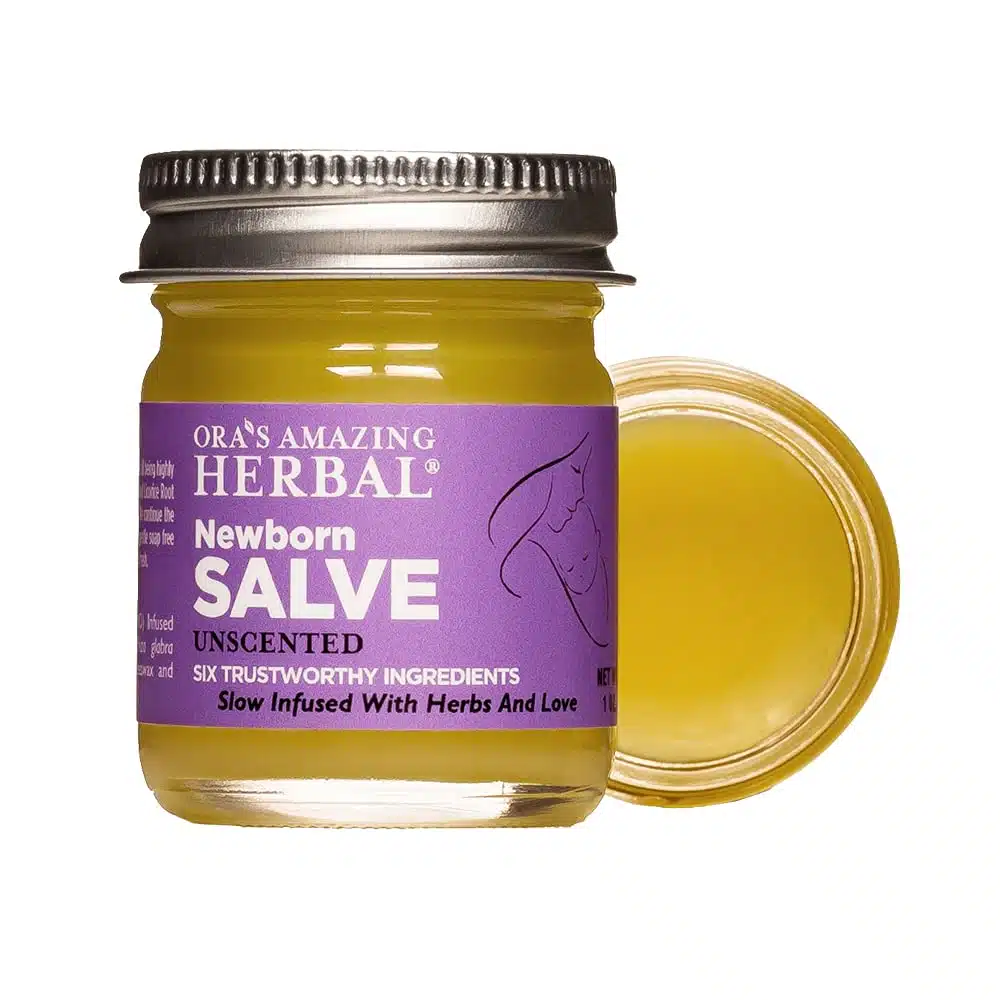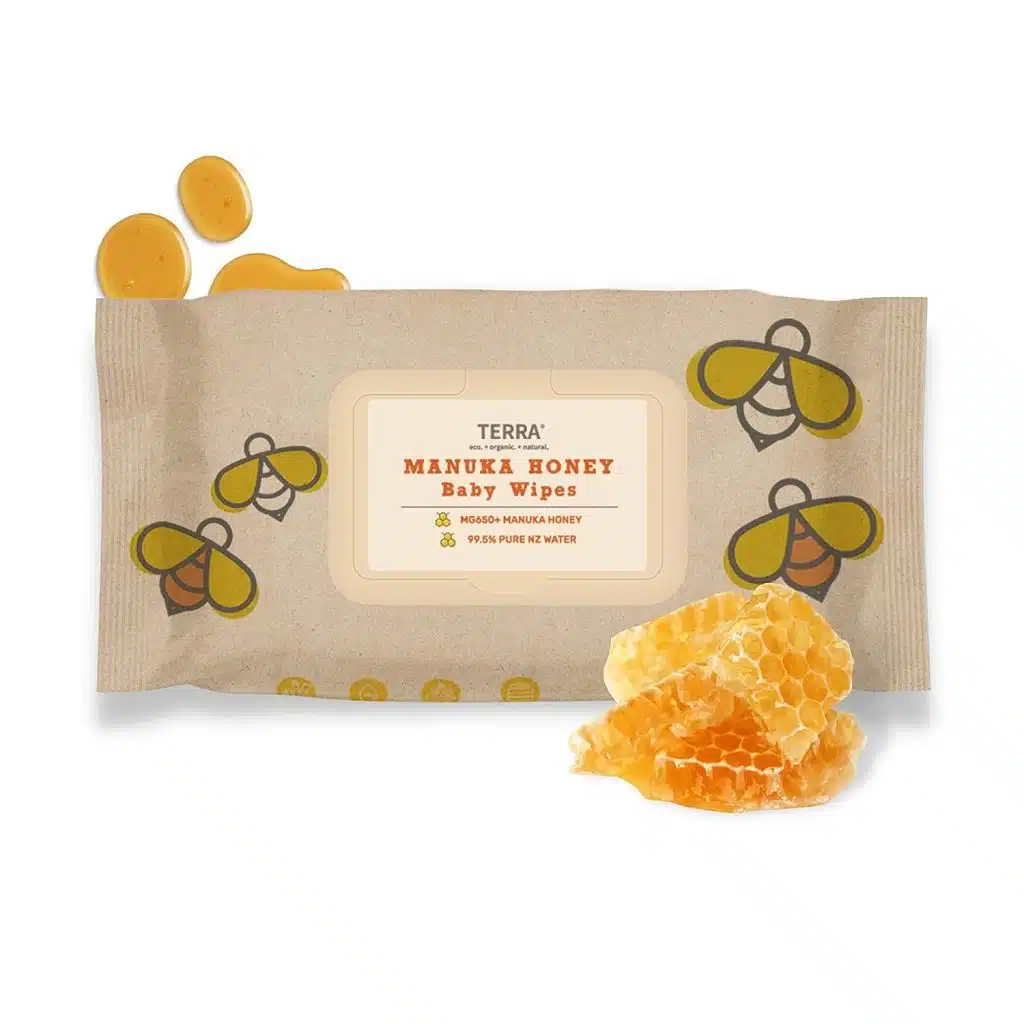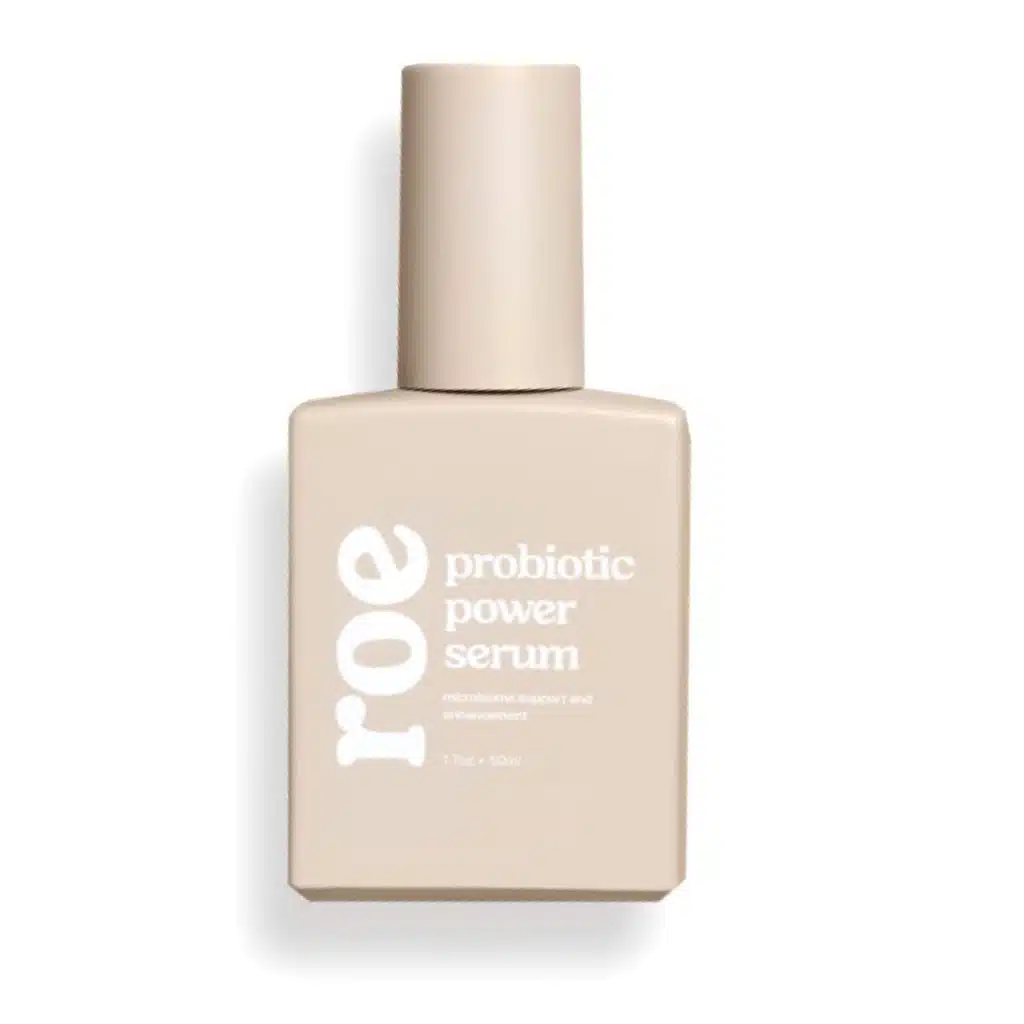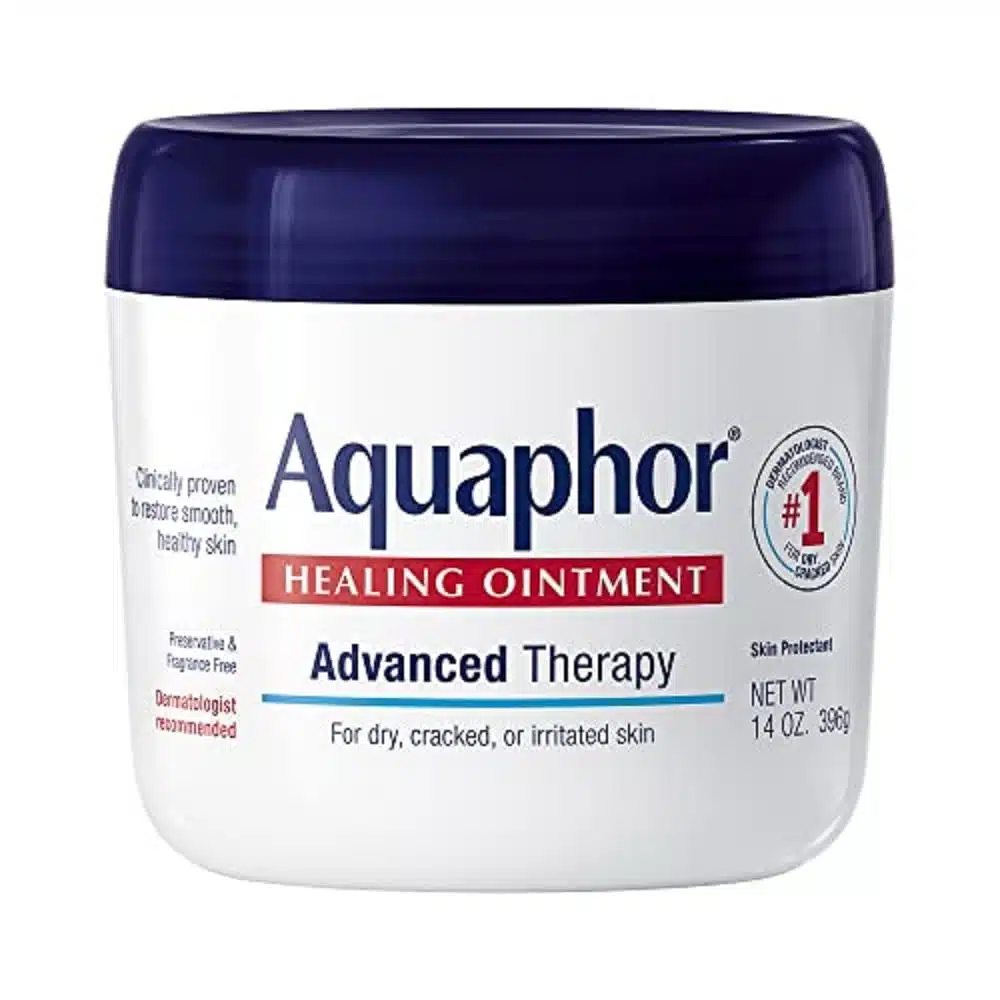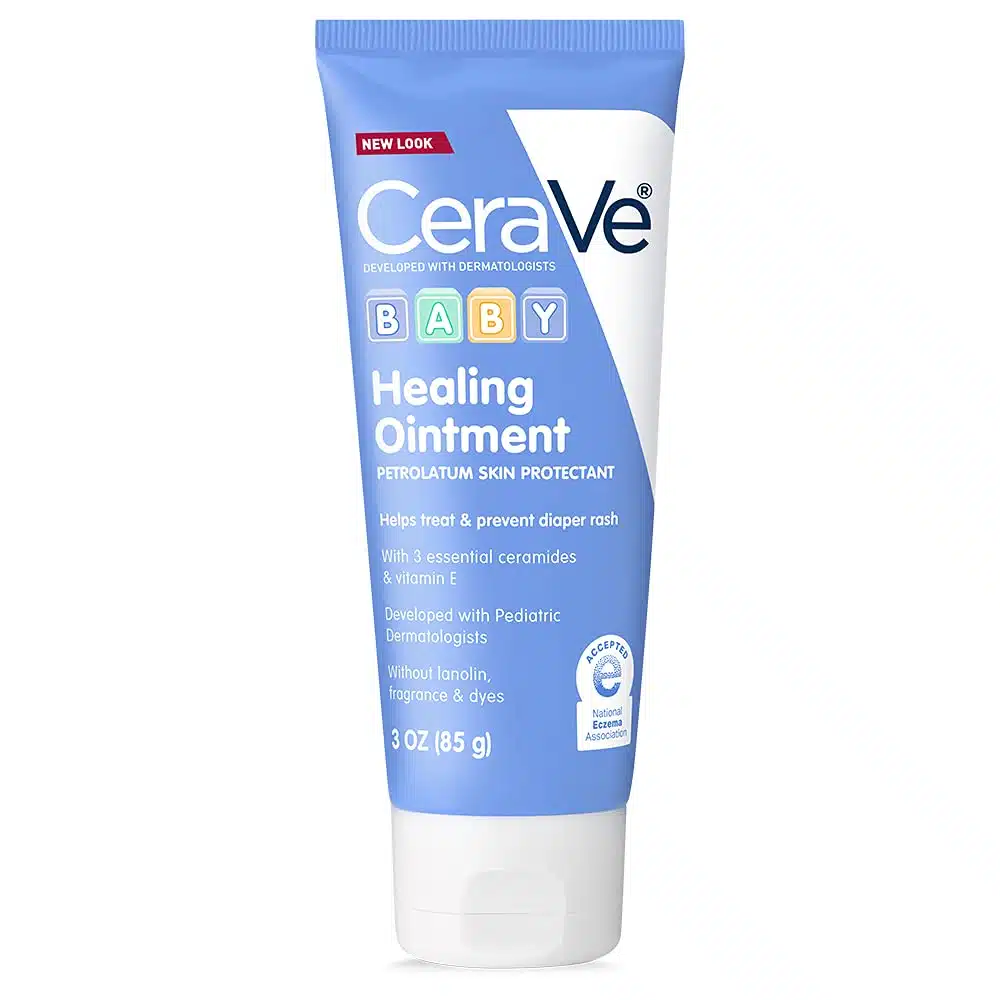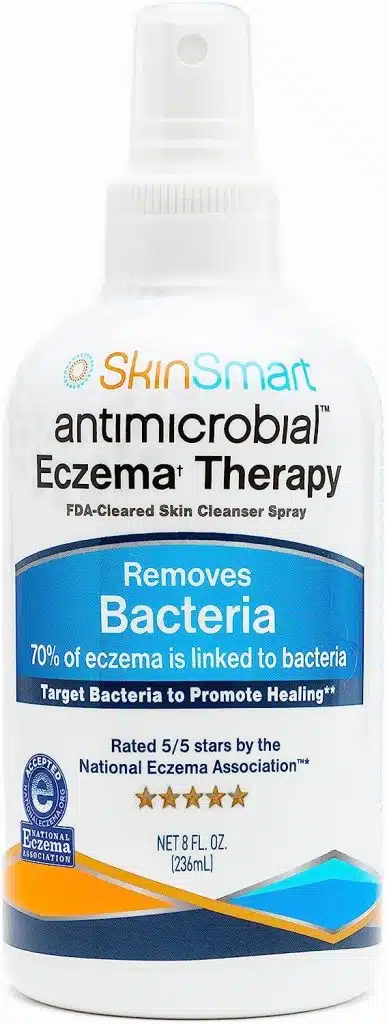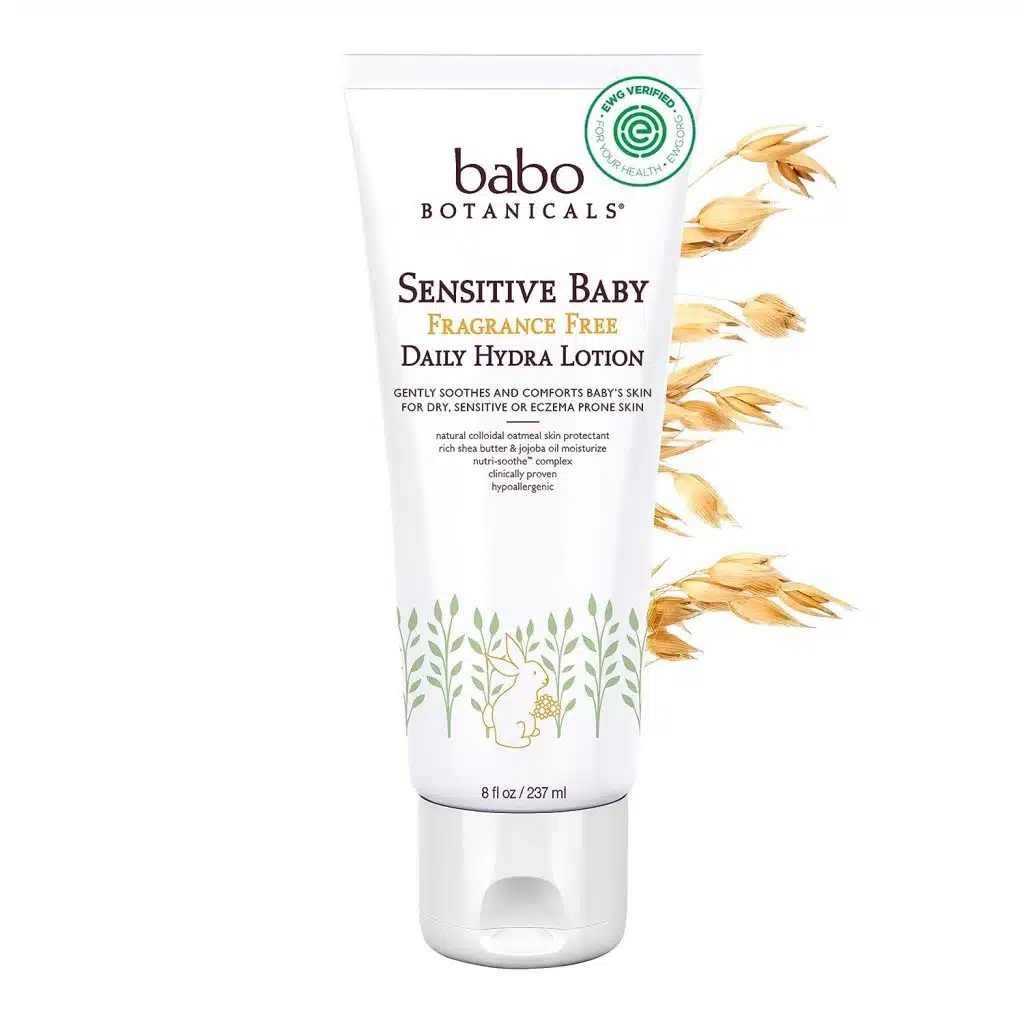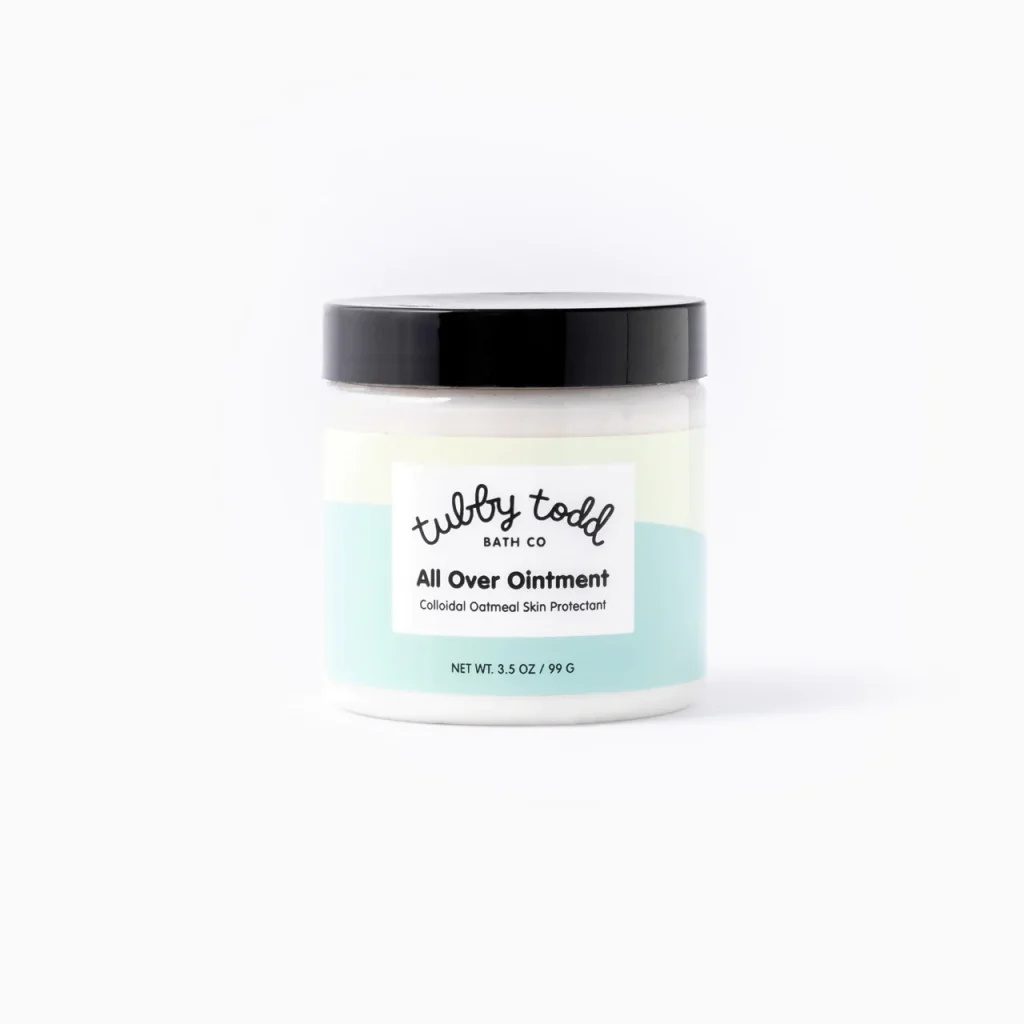This post will cover the differences between baby eczema vs acne.
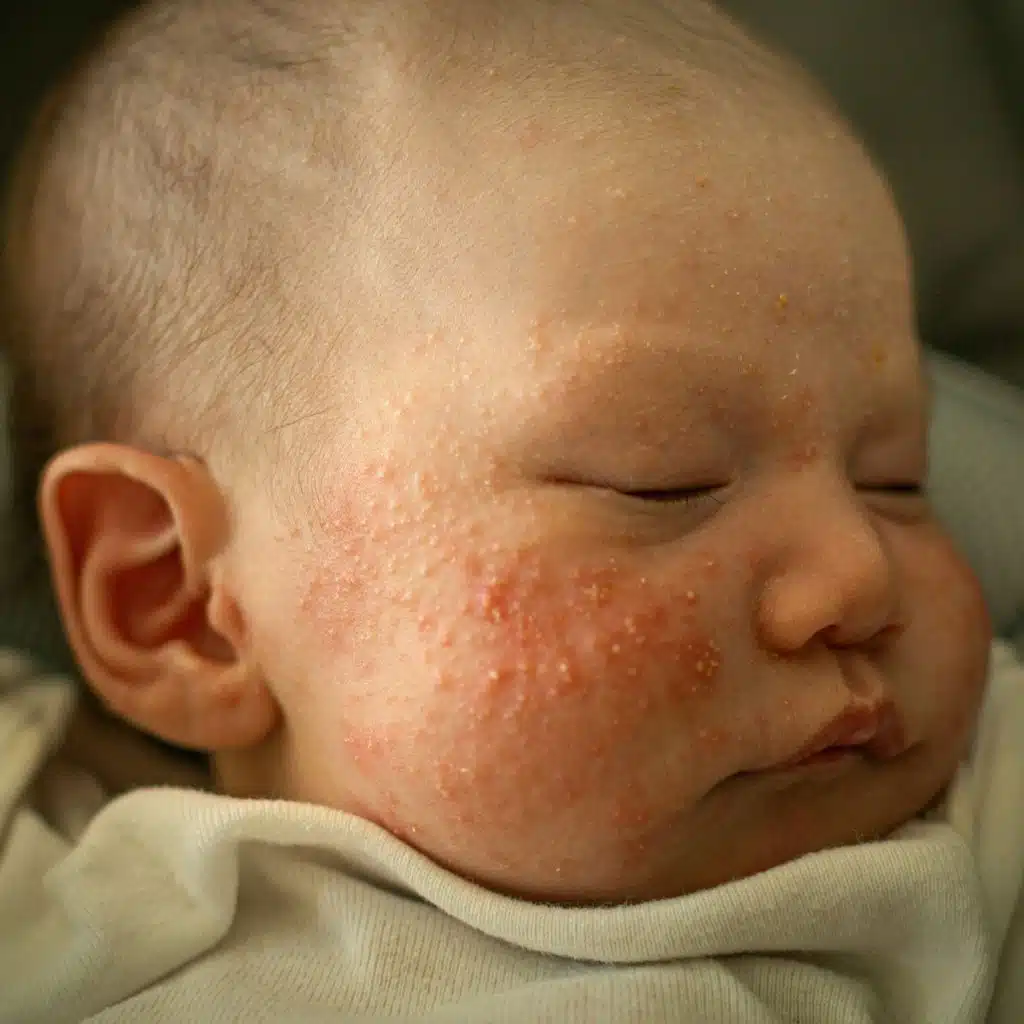
For more helpful and fun content, follow me on Pinterest!
This post is not intended to replace medical advice nor is it a medical diagnosis. For informational purposes only.
Baby’s skin is so delicate and sensitive common skin condition issues such as infant acne, severe eczema, and other skin infections can wreak havoc on your child’s skin.
However, baby acne and eczema are different skin conditions that often look the same. This makes it difficult to decipher what’s happening with your baby’s delicate skin. In severe cases, baby’s face can get dry and irritated.
Ensuring we know what we’re dealing with will help ease baby of their skin irritations. Learning to recognize the symptoms of eczema and the exact cause of baby acne can help us find baby the proper relief they need to heal.
As a mom, I know how frustrating and helpless you can feel when babyis struggling with skin irritations.
Skin problems are common in the first year, so let’s get into it.
This post covers the difference between baby eczema vs acne.
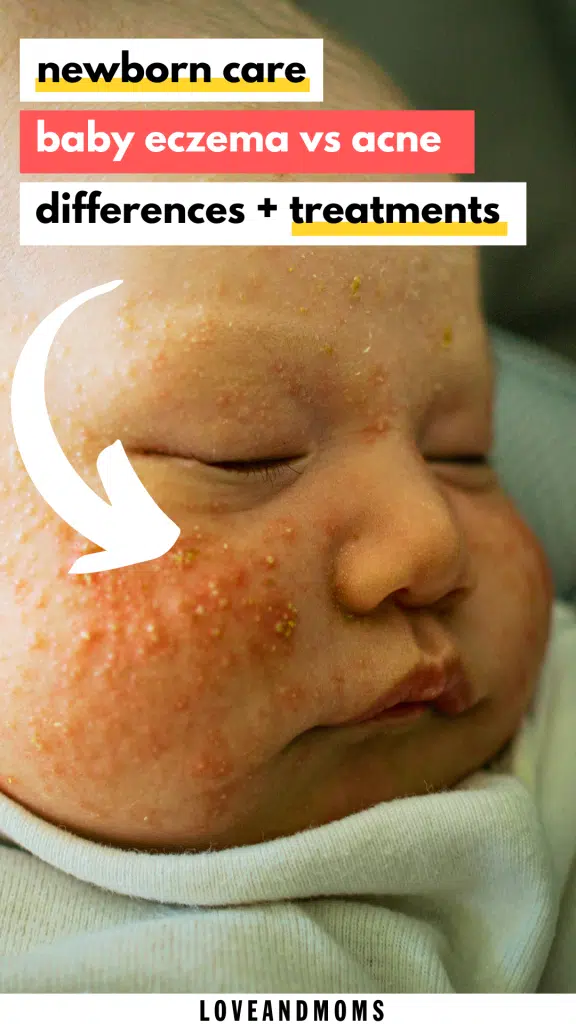
Baby Eczema vs Acne
Acne commonly involves hair follicles clogged with dead skin cells and excess sebum. It can cause whiteheads, blackheads, pimples, and pustules.
Eczema is a chronic skin condition that can cause itchy, patchy, rough, and inflamed skin. Both conditions can be temperamental but, most of the time, treatable after a proper diagnosis.
What Are Baby Acne Breakouts?
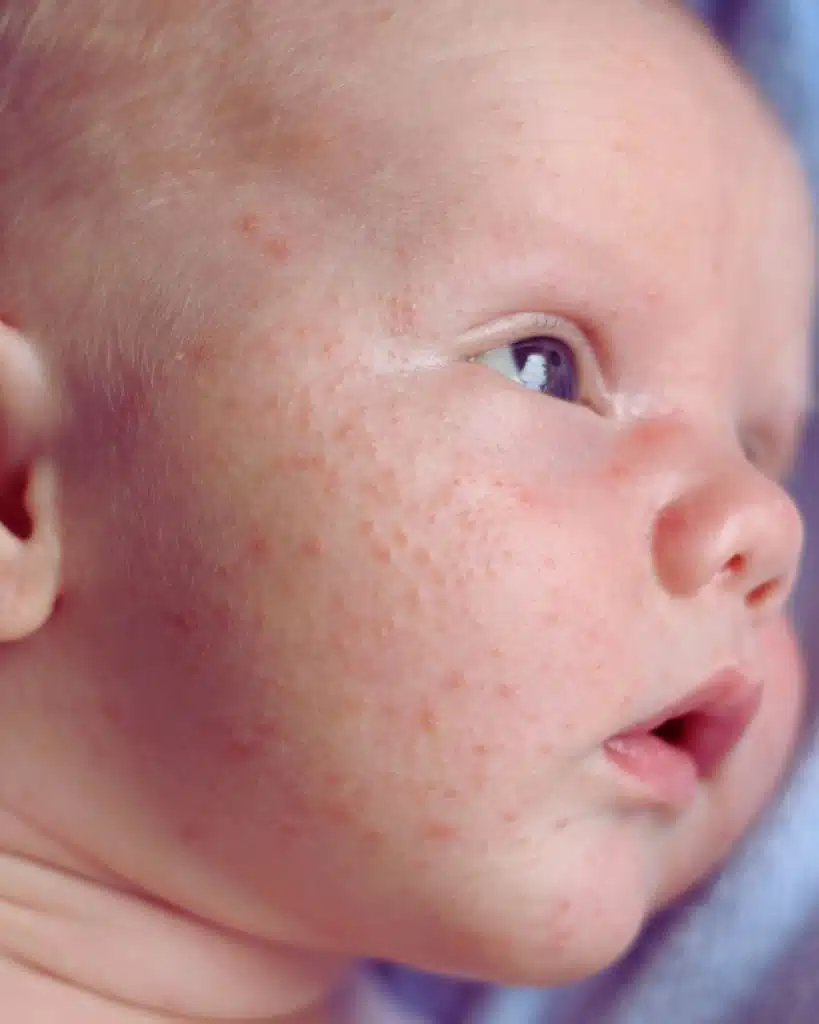
Baby acne, neonatal acne, or infantile acne occurs in about 2-10 newborn babies.
Newborn acne is a common skin condition on a newborn baby’s cheeks and sometimes on other parts of their face. It manifests as small red or white bumps that resemble pimples and might have a slightly inflamed appearance.
Baby acne is a temporary and benign condition that typically emerges within the first few weeks after birth.
It’s thought to be caused by the lingering maternal hormones in the baby’s body, which stimulate the oil glands, resulting in the development of these small acne-like bumps.
Despite its resemblance to adult acne, baby acne is not the same and does not require treatment in most cases.
It tends to resolve independently within a few weeks to a few months as the baby’s hormone levels normalize and their skin adapts to the new environment.
Parents can help manage the condition by gently cleansing the baby’s face with water and avoiding harsh skin products.
While a baby’s acne might cause some concern, it’s generally a temporary and harmless skin issue that does not require medical intervention unless it becomes unusually severe or prolonged.
What are The Causes of Baby Acne?
Baby acne, also known as neonatal acne, is believed to be primarily caused by the influence of maternal hormones passed to the baby during pregnancy.
These hormones, particularly androgens, stimulate the baby’s oil glands, increasing oil production. As a result, the pores on the baby’s skin can become clogged with oil, dead skin cells, and possibly bacteria, developing small red or white bumps resembling pimples.
While the exact mechanism isn’t fully understood, the role of hormones in baby acne is supported by research.
A study published in the Journal of the American Academy of Dermatology 2015 discusses how maternal hormones, particularly maternal androgens, can impact the baby’s skin and contribute to developing baby acne.
Symptoms
Baby acne typically presents as small red or tiny white bumps on a newborn’s face, especially on the cheeks, nose, and forehead.
The type of acne can vary.
These bumps may resemble tiny red bumps and can be slightly raised or inflamed. It’s important to note that baby acne is generally not accompanied by other symptoms like fever, discomfort, or fussiness.
The bumps of baby acne might come and go, and unlike in the teen years, they’re usually not painful or itchy for the baby.
Baby acne is a temporary and self-limiting condition, often appearing within the first few weeks after birth and gradually fading away within a few weeks to a few months.
Parents must resist the urge to pick or squeeze the bumps, which can lead to irritation or infection. I know it’s hard but you must!
If you’re unsure whether your baby’s skin condition is indeed baby acne or if you’re concerned about their skin health, it’s recommended that you consult the baby’s pediatrician or a healthcare provider for proper diagnosis and guidance.
Related Reading: 11 Super Effective Remedies for a Teething Baby
Treating Baby Acne

Caring for baby acne involves gentle and minimal interventions, as the condition tends to resolve independently over time. Here are some tips to help manage and care for baby acne:
- Keep It Clean: Gently cleanse your baby’s face with lukewarm or cool water once a day. Avoid using harsh soaps or cleansers that could further irritate the skin.
- Avoid Scrubbing: Refrain from scrubbing or rubbing your baby’s skin aggressively. This can worsen irritation and potentially cause discomfort for your baby.
- Use Mild Baby Products: Use mild, fragrance-free baby skincare products if necessary. Look for products that are formulated for sensitive skin and avoid those with harsh ingredients.
- Keep the Skin Moisturized: Apply a gentle, hypoallergenic, and fragrance-free moisturizer to your baby’s skin. Moisturizing can help prevent excessive dryness and discomfort.
- Don’t Squeeze or Pick: Resist the urge to pick or squeeze the bumps. This can lead to further irritation, infection, or scarring.
- Dress Comfortably: Choose soft, breathable fabrics for your baby’s clothing and bedding. Avoid tight clothing that might rub against the affected areas.
- Limit Exposure to Potential Irritants: Avoid using harsh detergents, fragrances, or other products that could irritate your baby’s sensitive skin.
- Be Patient: Baby acne is usually a temporary condition that clears up within a few weeks to a few months. Patience is key.
- Breast Milk: Dabbing your breastmilk on baby’s acne and rashes benefits their skin health.
Best Products For Baby Acne
I get it if you don’t want to wait for the acne to disappear. Here are some of the best products to help treat your baby’s acne in a gentle and non-abrasive way.
1. Newborn Salve
This Herbal Newborn Salve has calendula and is packed with healing herbs to help baby’s acne clear up. It’s gentle with no fragrance and full of love!
2. Manuka Honey Wipes
Keep baby acne clean and bacteria-free with these gentle, hydrating Manuka Honey Baby Wipes! Packed with New Zealand Water and bamboo, it’s safe, light on baby’s face, and a great way to keep clean without being too harsh on the skin.
3. Active Skin Repair Spray
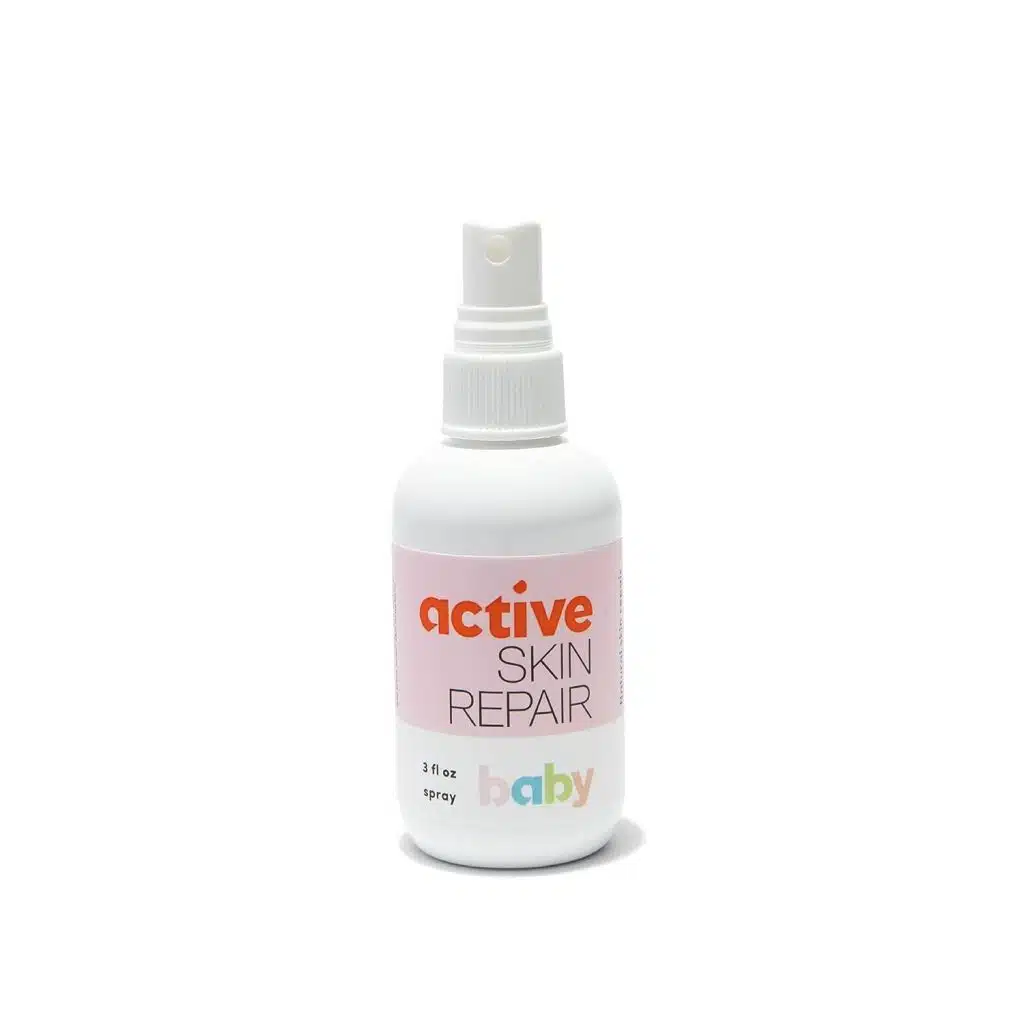
Help treat baby’s acne with an active skin repair spray to help baby’s skin garner balance again.
4. Roe Wellness Baby Probiotic Serum
Did you know that our skin has good and bad bacteria on it? Yeah. If it gets out of wack, it can cause skin issues like baby acne or eczema. Replenish baby’s skin microbiome with this soothing probiotic serum.
What is Baby Eczema?
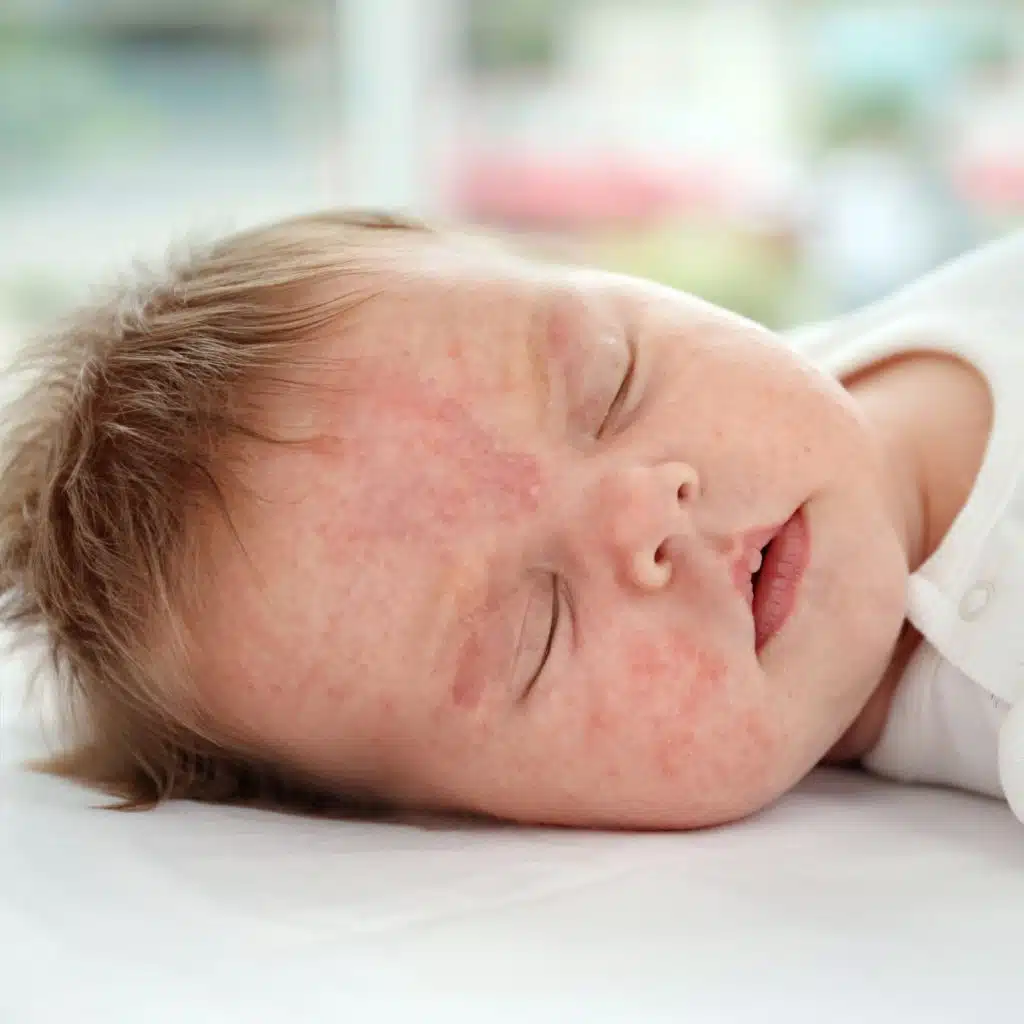
Eczema, classified as an inflammatory skin condition, is characterized by dry, itchy skin that can manifest in various forms.
It can sometimes be misunderstood as heat rash. According to the National Eczema Association, it’s a common chronic condition that can affect people of all ages, including infants.
One variant, known as atopic dermatitis, often leads to red, irritated patches on the skin’s surface, which can become inflamed, itchy, and uncomfortable.
This condition is commonly found in families with a history of allergies, asthma, or hay fever, suggesting a genetic link between these conditions.
Infants with eczema might experience these symptoms in the diaper area, where the skin comes into contact with moisture.
This could cause additional discomfort and redness, adding to the overall irritation.
Annabelle struggles greatly with Eczema, a nagging dry skin condition that is no fun.
Related Reading: 15 Best Baby Constipation Remedies That Work Fast
Types of Eczema
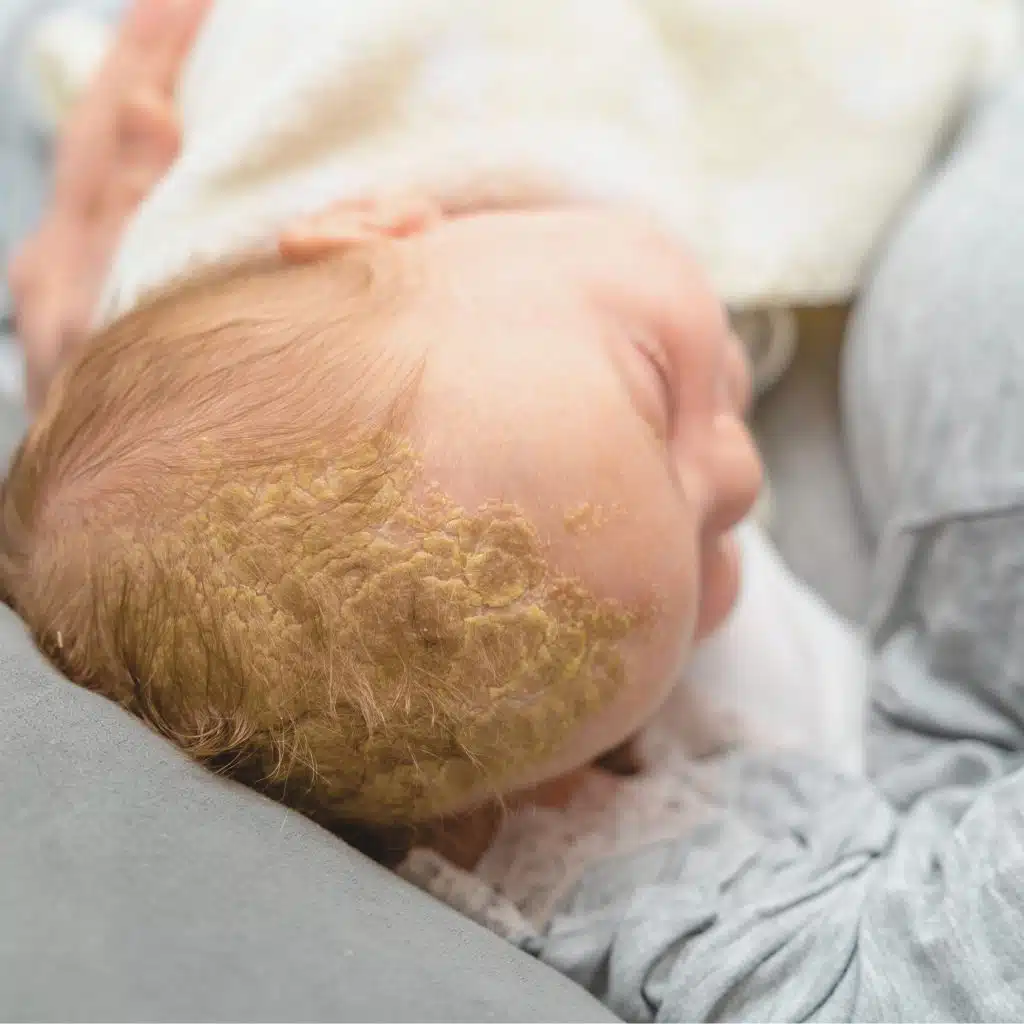
- Atopic Dermatitis: This is the most common form of eczema, often associated with a family history of allergies, asthma, or hay fever. It leads to dry, itchy, inflamed skin and can appear as red patches, blisters, or crusted lesions.
- Contact Dermatitis: This type is triggered by contact with allergens or irritants, such as certain fabrics, cosmetics, fragrances, or chemicals. It results in redness, itching, and sometimes the development of small blisters or oozing skin.
- Dyshidrotic Eczema: Also known as pompholyx, this type affects the palms of the hands and the soles of the feet. It causes small, itchy blisters that can be painful and may become large and painful over time.
- Nummular Eczema: This type presents as coin-shaped patches of irritated skin that can be extremely itchy and may ooze or crust. It’s often triggered by dry skin and can be worsened by cold, dry weather.
- Seborrheic Dermatitis (Cradle Cap): Commonly seen in infants, this type causes oily, yellow, or brownish scales on the baby’s scalp. More severe symptoms can look like a yellow crust and affect other body parts, such as the face and diaper area. The cradle cap is usually not itchy and resolves independently over time.
Symptoms of Baby Eczema

- Dry, Itchy Skin: Dryness and intense itching are hallmark symptoms of baby eczema. Babies with eczema may constantly scratch or rub their skin in response to the discomfort.
- Red or Inflamed Patches: Affected areas of the baby’s skin might appear red, inflamed, or irritated. These patches can be rough, raised, or slightly swollen.
- Rash or Bumps: Baby eczema can lead to the development of small bumps, which may become red, swollen, and even ooze fluid if scratched excessively.
- Scaling or Crusting: Over time, eczema-affected skin can become scaly, dry, and even develop crusts, particularly if the baby frequently scratches the affected areas.
- Affected Areas: Eczema can appear on various parts of the baby’s body, but it’s commonly found on the face (especially the cheeks), scalp, behind the ears, neck, and in the bends of the elbows and knees ( where Annabelle struggles with it.)
Treating Baby Eczema

- Regular Moisturizing: Keeping your baby’s skin well-moisturized is crucial. Apply a gentle, fragrance-free moisturizer regularly, especially after bath time. Moisturizers help lock in hydration and create a protective barrier, reducing dryness and discomfort.
- Gentle Skincare Routine: Use mild, fragrance-free baby cleansers and soaps to avoid further irritation. Bathe your baby in lukewarm water for short periods and pat their skin dry with a soft towel—avoid rubbing, as it can worsen irritation. Always do a spot test for an inflammatory reaction before dousing baby.
- Avoid Irritants and Allergens: Identify and avoid triggers that might worsen your baby’s eczema. These could include harsh soaps, laundry detergents, fragrances, certain fabrics, and potential allergens. Cotton clothing and bedding are generally recommended for breathability and reduced irritation potential.
- Consult a Healthcare Professional: If your baby’s eczema is severe, persistent, or causing significant discomfort, consult a pediatrician or dermatologist. They can recommend appropriate treatments, including over-the-counter or prescription creams, ointments, and other therapies tailored to your baby’s needs.
Best Products For Baby Eczema
Let’s look at some of the best skin care and healing products to help give your baby the relief they need.
1. Aquaphor Healing Ointment
I absolutely love Aquaphor Healing Ointment. I use it to help treat Annabelle’s eczema and her heat rashes during summer. It’s gentle, soothing, and has minimal ingredients with NO fragrance. Yay!
2. CeraVe Healing Ointment
If you’ve read my 25 Best Pregnancy-Safe Body Lotions, Creams & Oils, you’ll know how much I adore CeraVe. It’s one of the best skin care lines, super effective, affordable, gentle, and fragrance-free! I also used this a lot for Annabelle’s eczema and heat rashes. It’s great for daycare and on the go.
3. SkinSmart Antimicrobial Eczema Spray
If you feel the baby’s eczema is beginning to turn cracked, peeling, and bloody, try this SkinSmart Antimicrobial Eczema Therapy Spray.
When Annabelle’s eczema would get really bad in her creases during summer, regular creams and butter wouldn’t cut it.
This spray worked beautifully at combating inflammatory bacteria on her skin that was making it worse. It works REALLY fast, and then you can continue to treat it with lotion.
4. Sensitive Baby Daily Hydration Lotion
I love Babo Botanicals. This lotion is packed with colloidal oatmeal, chamomile, and calendula for the ultimate soothing trifecta for baby.
5. Tubby Todd Fragrance-Free All-Over Ointment
Tubby Todd’s All Over Ointment has been a popular mom favorite for years! Moms swear by this ointment and how it combats pretty much any skin condition your baby has!
Related Reading: 7 Causes Why Baby Sleeps With Their Mouth Open
Baby Eczema vs Acne
Knowing which skin issues your baby is dealing with can help you proceed with treatment.
Baby Acne
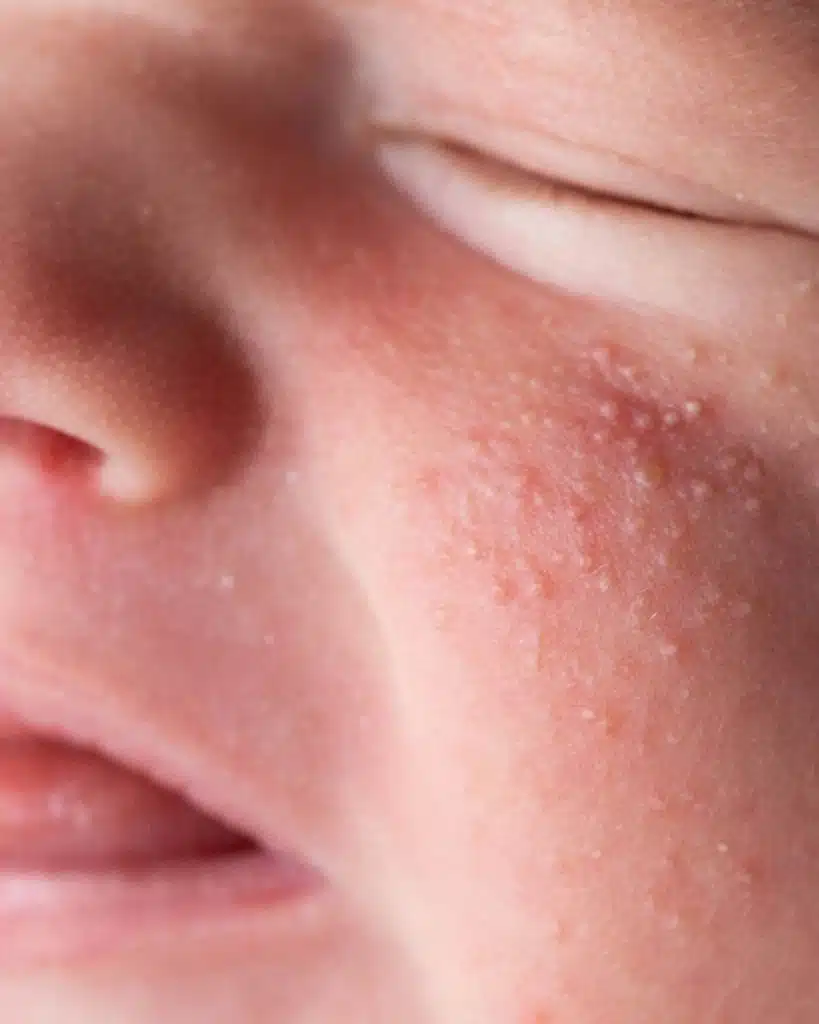
- Appearance: Baby acne appears as small red or white bumps, often resembling tiny pimples. They might be slightly raised and can have a mildly inflamed look.
- Location: Baby acne typically appears on the baby’s face, especially on the cheeks, nose, and forehead. It usually doesn’t extend beyond these areas.
- Timing: Baby acne tends to develop within the first few weeks after birth and gradually improves over time.
- Texture: Baby acne bumps are often firm to the touch and might have a pimple-like texture.
- Pain and Itchiness: Baby acne is generally not painful or itchy for the baby, and babies are usually not bothered by it.
- No Other Symptoms: Baby acne is usually isolated and doesn’t cause other symptoms like fever or fussiness.
Baby Eczema (Atopic Dermatitis):

- Appearance: Baby eczema appears as red, inflamed patches of skin that can be dry, scaly, and rough. It might also develop into oozing, crusted lesions if scratched.
- Location: Baby eczema can occur on various body parts, including the face, scalp, neck, and bends of the elbows and knees. It’s not limited to the face.
- Timing: Baby eczema often develops within the first few months of life. It can come and go periodically.
- Texture: Eczema-affected skin can be dry, rough, and scaly, and it tends to become more irritated when scratched.
- Pain and Itchiness: Baby eczema is often intensely itchy, which might cause discomfort for the baby and lead to scratching.
- Possible Allergic Connection: Baby eczema can be associated with a family history of allergies, asthma, or hay fever.
Preventing Baby Acne and Eczema
Preventing baby acne and eczema involves taking proactive steps to minimize potential triggers and maintaining proper skincare practices. Here’s how to help prevent these skin changes.
Preventing Baby Acne:
- Keep the Face Clean: Clean your baby’s face with lukewarm water and a soft cloth daily to remove excess oils and impurities. Avoid using harsh soaps or cleansers.
- Avoid Overstimulating the Skin: Refrain from using lotions, creams, or oils on your baby’s face, as these can clog pores and contribute to the development of baby acne.
- Choose Gentle Fabrics: Use soft, breathable fabrics for your baby’s bedding and clothing. Avoid fabrics that might cause friction and irritation.
- Avoid Overhandling: Limit touching or rubbing your baby’s face unnecessarily, as this can introduce oils and dirt to the skin.
- Be Patient: Baby acne is usually temporary and will likely resolve independently. Avoid using acne treatments or picking at the bumps.
Preventing Baby Eczema:
- Maintain Proper Moisturization: Regularly moisturize your baby’s skin using a gentle, fragrance-free moisturizer to prevent dryness, which can trigger eczema flare-ups.
- Use Mild Cleansers: Opt for mild, hypoallergenic baby cleansers and avoid harsh soaps or detergents that can strip the skin of its natural oils.
- Avoid Irritants: Steer clear of irritants like strong perfumes, scented lotions, and certain fabrics that could trigger or worsen eczema.
- Control Environmental Factors: Keep your baby’s environment comfortable and avoid extreme temperatures and humidity, which can exacerbate eczema symptoms.
- Maintain a Healthy Diet: If you’re breastfeeding, a balanced diet that avoids potential allergens can help reduce your baby’s risk of eczema development.
- Identify Allergies: Consult a healthcare professional if you notice a specific trigger that worsens your baby’s eczema, such as a certain food or environmental factor.
Baby Eczema vs Acne
As a mama, I know how important it is to understand the differences between baby acne and baby eczema for parents to provide the appropriate care for their infants’ delicate skin.
Baby acne is harmless and temporary, characterized by small red or white bumps on the face. In contrast, baby eczema, marked by dry, inflamed patches, can be more persistent and uncomfortable.
By following gentle skincare practices, avoiding potential triggers, and seeking professional guidance, parents can help prevent, manage, and provide comfort for these common skin conditions.
Remember, each baby’s skin is unique, so patience, observation, and consultation with healthcare professionals are key to ensuring the well-being of your baby’s skin.
Hopefully, after the first year, you won’t have to deal with acne until your teenage years!
Good luck, mama.

